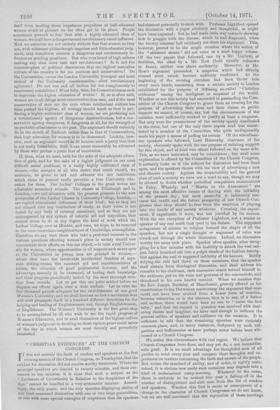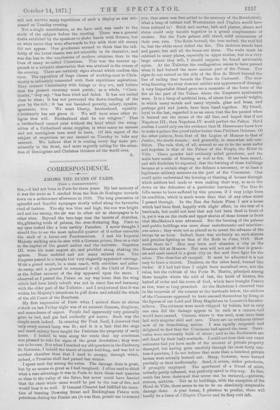" CHRISTIAN EVIDENCES" AT THE CHURCH CONGRESS.
TT was not entirely the fault of readers and speakers at the first evening session of the Church Congress, on Tuesdaylast, that the subject for discussion did not receive worthy treatment. 'Where the principal speakers are limited to twenty minutes, and their suc- cessors to ten minutes, it is clear that such a subject as the " Evidences of Christianity in Relation to the Scepticism of the Age" cannot be handled in a very systematic manner. Accord- ingly, the only paper, and the only speeches displaying ability of any kind contented themselves with one or two largo generalities, or else with some special examples of scepticism that the speakers had chanced personally to meet with. Professor Lightfoot opened the discussion with a paper scholarly and thoughtful, as might have been expected ; but he had made little way towards showing how to grapple with the .disease, which he had diagnosed, when the twenty minutes' bell ruthlessly cut short his argument. This, however, proved to be the single occasion where the action of the "abhorred shears" did not come as a most happy release. Of the two papers that followed, one by a Mr. Garbett, of Surbiton, the other by a Mr. Row (both equally unknown to fame), neither rose above mediocrity. Moreover, as Mr. Row's argument proceeded, a suspicion which had already crossed some minds become suddenly confirmed. At the beginning of the evening circulars had been thrust into every one's hands, emanating from a certain society in London established for the purpose of diffusing so-called " Christian evidences " among the irreligious or sceptical of the world. Whether or not this society had succeeded in persuading the Com- mittee of the Church Congress to grant them an evening for the purpose of advertising their aims and their claims on public- support we cannot, of course, say, but the circumstances of the occasion were sufficiently marked to justify at least a suspicion. Not only were the prospectuses of the society openly distributed in the room, but one of the only three papers read was contri- buted by a member of the Committee, who quite undisguisedly made his paper a means of puffing his society. Of the miscellane- ous speakers who followed, Lord Harrowby, chairman of the society, obviously spoke with the one purpose of enlisting support for this object, and at least two others followed on the same side. This, as we have intimated, may be coincidence ; but until some explanation is offered by the Committee of the Church Congress, it certainly looks as if the subject for discussion had been fixed upon, and the speakers chosen with the view of advertising a new and obscure society. Against the respectability and the general aims of such a society we have not a word to say, though wo may be allowed to doubt whether periodical competitive examinations in Paley, Whately, and " Martin on the Atonement " are among the most effective means of dealing with the infidelity of the present day ; but most assuredly it intimately con- cerns the credit and the future prosperity of our Church Con- gresses that they should be free from the suspicion of playing_ into the hands of any society whatever. Certainly, the experi- ment, if experiment it were, was not justified by its success.. With the one exception of Professor Lightfoot, not a reader or speaker of any real mark took part in the debate. The supposed antagonism of science to religion formed the staple of all the speeches, but not a single thought or argument of value was• struck out through the whole discussion. Indeed, no discussion worthy the name took place. Speaker after speaker, after strug- gling for a few minutes with his inability to attack the real sub- ject, fairly launched out into a pulpit-tirade of the feeblest descrip- tion against the real or supposed infidelity of his hearers. Boldly defying the rule laid down on these occasions, that the speaker shall abstain from theological discussion, and shall address his remarks to the chairman, each successive orator turned himself to the audience, put on the voice and gestures of the conventicle, and thundered to his own heart's content. When we mention that the Rev. Joseph Bardsley, of Manchester, gravely offered as his contribution to the Darwinian controversy the argument that man. could not have been evolved from a lower form of creation, because otherwise, or in the absence, that is to say, of a father and mother, there would have been no one to " nurse the first baby," and that the remark in question was received with deaf- ening cheers and laughter, we have said enough to indicate the general calibre of speakers and audience on the occasion, It is• sufficient to add that the remaining speeches were curiously common-place, and, in many instances, disfigured by such vul- garities and buffooneries as have perhaps never before been wit- nessed at a Church Congress.
We notice this circumstance with real regret. We believe that Church Congresses have done, and may yet do, a not inconsider- able good. It is no small advantage for thoughtful men of all parties to meet every year and compare their thoughts and ex- periences on matters concerning the faith and morals of the people. But unless the standard of ability, and of order, is rigidly main- tained, it is obvious how easily such occasions may degrade into a. kind of ecclesiastical camp-meeting. Whatever be the cause, i there is certainly to be noticed this year a falling-off in the number of distinguished and able men from the list of readers and speakers. Whether this fact is cause or consequence of a change in the character of Church Congresses we do not know, but we are well convinced that the reputation of these meetings will not survive many repetitions of such a display as was wit- nessed on Tuesday evening.
Not a single contribution, as we have said, was made to the study of the subject before the meeting. There was a general desire exhibited by the speakers to shake hands with Science, but on what terms they were afterwards to live with their old enemy did not appear. One gentleman seemed to think that the infi- delity of the lower classes was not scientific in its character, and was due less to the conclusions of modern criticism than to the lives of many so-called Christians. This was the nearest ap- proach to a valuable observation that was attained in the course of the evening. There are certainly signs abroad which confirm this view. The opposition of large classes of working-men to Chris- tianity is intimately connected with their republican aspirations. They connect Christianity with things as they are, and believe that the present economy must perish ; as a whole, " Chris- tianity," they say, " has been tried and failed. It has not united class to class ; it has not prevented the down-treading of the poor by the rich ; it has not banished poverty, misery, squalor, ignorance, vice. We want liberty, brotherhood, equality. Christianity has not given it. We will have some other re- ligion that will. Brotherhood shall be our religion." That a brotherhood cannot exist without the bond which the recog- nition of a Fatherhood alone supplies, is what many an earnest and not unreligious man need to learn. Of this aspect of the subject of scepticism no one seemed on Tuesday to take any account. We believe that it is coming every day more pro- minently to the front, and more urgently calling for the atten- tion of theologians and Christian thinkers all the world over.
A.



































 Previous page
Previous page